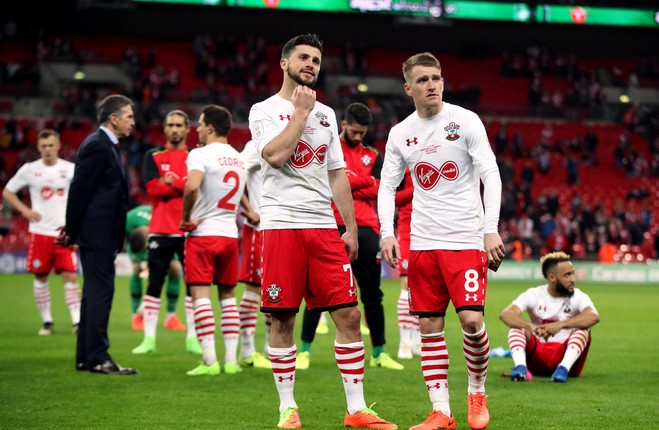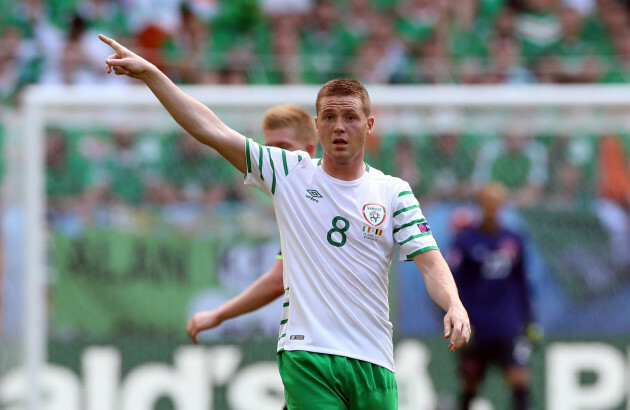Updated at 19.45
AROUND THIS TIME last year, Shane Long was hitting career-best form.
The 2015-16 campaign was a stellar season for the Tipperary native. He played a major part in Ireland’s Euro 2016 qualification campaign, scoring the winning goal in Ireland’s famous win over Germany.
With Robbie Keane’s career winding down, he appeared to establish himself as Ireland’s first-choice striker.
At Euro 2016 itself, the 30-year-old striker was influential, winning one penalty against France and being harshly denied at least one other in the Belgium game.
At club level too, Long looked better than ever, reaching double figures for the first time in the Premier League goalscoring charts and helping the Saints to a sixth-place finish. The Daily Echo even named him Southampton’s Player of the Season.
Yet, as Claudio Ranieri and others will know, football is a fickle business. Despite Long being arguably Southampton’s best player last year, he has been unable to build on the previous season’s progress.
Claude Puel replaced Ronald Koeman as Saints boss in the summer and the French manager has not shown the same kind of faith in the Irish striker as his predecessor.
Having been an integral part of the side last season, Long has largely had to be content with being a squad member and impact sub of late for the Saints.
After failing to score in his opening two Premier League games, Long was dropped to the bench for Southampton’s third game of this season against Sunderland. And since then, he has found first-team action hard to come by.
While Long has made 38 appearances in all competitions, of Southampton’s 25 Premier League games this season, he has started just seven.
Unsurprisingly therefore, the star has looked short of confidence at times. Out of the six goals he has managed this season, only three have been in the Premier League.
In order to thrive, Long seemingly needs a manager who believes in him, as Ronald Koeman did and Martin O’Neill seemingly does now.
It is often said that he is not a natural goalscorer, but the player might argue that he has been mismanaged and all too often not been given a proper chance.
Aged 24, Long showed evidence of his potential with 21 goals in 44 appearances during a single season in the Championship with Reading.
That form earned him a Premier League move to West Brom, where his goalscoring was less consistent. 19 goals in 81 appearances for the Baggies is not overly impressive, but Long was often used from the bench or substituted during this period, while also being asked to play on the wing on occasion.
After a brief stint at Hull, Long earned an eyebrow-raising £12 million move to his current employers, and just as he appeared to be finding his feet with the Saints, he was reduced to the role of bit-part player by Puel.
Even for Ireland, Long has not been a regular starter until recently. In the Euro 2016 qualifiers, he started just two of Ireland’s 12 qualifiers. Moreover, before that campaign, Long had only completed 90 minutes in two competitive games for his country — Slovakia in 2010 and Sweden in 2013.
Consequently, the claim that Long is not a natural goalscorer should come with the caveat that his chances to prove himself at the top level have tended to be limited to an extent.
Moreover, on Sunday, for the biggest game of Southampton’s season, the EFL Cup final against Manchester United, Long again had to be content with a cameo role.
Despite scoring a crucial goal in another substitute appearance in the semi-final against Liverpool, the Irish international was only given his chance in the 83rd minute.
The decision was hard to argue with. Manolo Gabbiadiani, Southampton’s starting striker, scored twice and should have had a hat-trick during the game.
The man Southampton splashed out €17.5 million on in January is unlikely to be displaced in the starting XI any time soon, so Long may have to look elsewhere if he wants regular first-team football.
The situation is a stark reminder of how difficult life can be for Irish (or other) footballers at the elite level of the game.
You may have been Player of the Season like Long was last year, but a few ordinary games and a big English club will simply splash the cash on an expensive foreign import to take your place in the team.
The dilemma is an issue not just for Long but for Irish footballers at large. This season, with Long, James McCarthy and James McClean — three key players for the Irish side — struggling to get in their clubs’ starting XI, the situation is seemingly as bad as ever.
Of the top 10 Premier League teams currently, only three Irish stars could legitimately be described as regular starters — Glenn Whelan (Stoke), Seamus Coleman (Everton) and Darren Randolph (West Ham).
Of course, that number is doubled if you take 11th place Burnley into consideration (Jeff Hendrick, Robbie Brady and Stephen Ward are all important players for the Clarets).
But regardless, the situation is a concern, and the Boys in Green may soon need to become more reliant than ever on players from the Championship.
It must also be added that the problem is not exclusively an Irish one. Man United had just two English players in their starting XI yesterday, with international players of the calibre of Wayne Rooney, Michael Carrick and Marcus Rashford left on the bench.
Watching Sunday’s game, when two top-class foreign strikers in Gabbiadiani and Zlatan Ibrahimovic had a big say on proceedings, some of the older viewers may have reflected on another memorable final of the same competition that United were involved in, which seems a distant memory now.
In 1994, Aston Villa beat Man United 3-1 in the League Cup final, a game that ultimately denied the Red Devils a historic treble, as Alex Ferguson’s side went on to win the league and FA Cup in the same season.
That day, only three non-British or Irish players were in the matchday squad for either team — Mark Bosnich (Australia), Andrei Kanchelskis (Russia) and Eric Cantona (France).
Six Irish players were involved in total — Roy Keane and Denis Irwin lined out for Man United, while Paul McGrath, Steve Staunton and Andy Townsend started for Ron Atkinson’s side, and Ray Houghton was one of the three subs Villa were permitted. How times have changed in just over 20 years since.
– Updated 19.30: An earlier version of this piece incorrectly stated that Long won a penalty against Italy at Euro 2016; it was against France.
The42 is on Instagram! Tap the button below on your phone to follow us!


